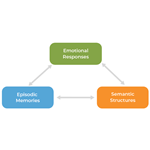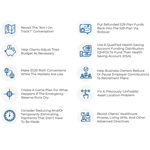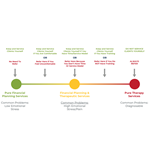It is natural for individuals to want to help their friends and family members in times of need, and doing so can be a healthy way to nurture those important relationships. However, establishing realistic boundaries is also important in healthy relationships, especially when the relationship dynamic involves a provider and dependent. For financial advisors, these become relevant issues when it comes to clients who are inclined to offer financial support to their friends and family, especially when that support continues on an ongoing basis and even more so when the support negatively impacts the client’s own financial plan, potentially interfering with the client’s own financial goals.
Well-structured emotional boundaries include limits, consequences, and consistent enforcement. They are keys to healthy relationships because they offer all parties involved clear rules that govern how to interact with one another to maintain the relationship. While good boundaries indicate that an individual understands their own needs and that they’ve established to others what their needs are (and what the consequences are if those needs are not met), they also provide other individuals with a framework of acceptable behaviors and consequences… as well as the autonomy of choosing whether to honor those expectations (or not).
When good boundaries are not established in a relationship, though, unhealthy behaviors and co-dependencies can arise. Financial enabling is one such example, whereby a financially dependent person (e.g., a child or family member) is continually supported by an enabling provider in such a way that limits the dependent’s own personal development. Dependent individuals in a financially enabling relationship are not only denied the opportunity to learn about financial responsibility, but they are also prone to feelings of inadequacy (perhaps they doubt their own ability to provide for themselves) and uncertainty (e.g., never knowing for certain whether their support will continue). Enablers, too, are impacted – not just by the potential loss of assets that may be an integral part of their own personal financial goals, but also by feelings of shame, guilt, and frustration (e.g., knowing that they shouldn’t be providing ongoing support, but not knowing exactly how to stop).
Accordingly, for financial advisors who have clients struggling in financially enabling relationships, there are a few things they can do to help. One option is simply to broach the subject of the problematic relationship and the role of boundaries and to offer the client some self-help resources to contemplate how they might establish boundaries to remedy the situation on their own, while keeping an open door to continue discussing the client’s progress on establishing those relevant boundaries to address the situation. Another option is for the advisor to offer boundary-building workshops to teach clients in a group setting about how boundaries can promote healthy relationships in the context of their finances.
Advisors can also refer their clients to mental health professionals that specialize in working with family relationship dynamics, as while advisors don’t need to be involved in the actual process of helping the client establish personal boundaries, they can still support their clients with enforcement and follow-through of boundaries. For example, the advisor can serve as the ‘gatekeeper’ to the client’s assets when it comes to the financially dependent individual, helping the client by being the one to deny requests to borrow money, support business ventures, or pay bills. Finally, advisors can support both their client and the enabled dependent by facilitating meetings with both to encourage dialogue, helping them to break the enabling nature of the relationship and to educate the dependent with strategies to become financially responsible and self-sufficient.
Ultimately, the key point is that advisors can help their clients address unhealthy relationships that involve financial enabling, and that may be detrimental to their clients’ financial plans by encouraging clients to examine and establish good boundaries with appropriate limits, consequences, and follow-through and by recognizing that patience and empathy are critical in this work, as the changes required to resolve financially enabling behaviors can be difficult and may need to happen slowly over long periods of time.











